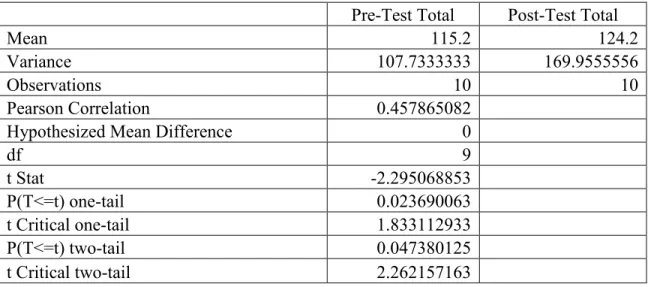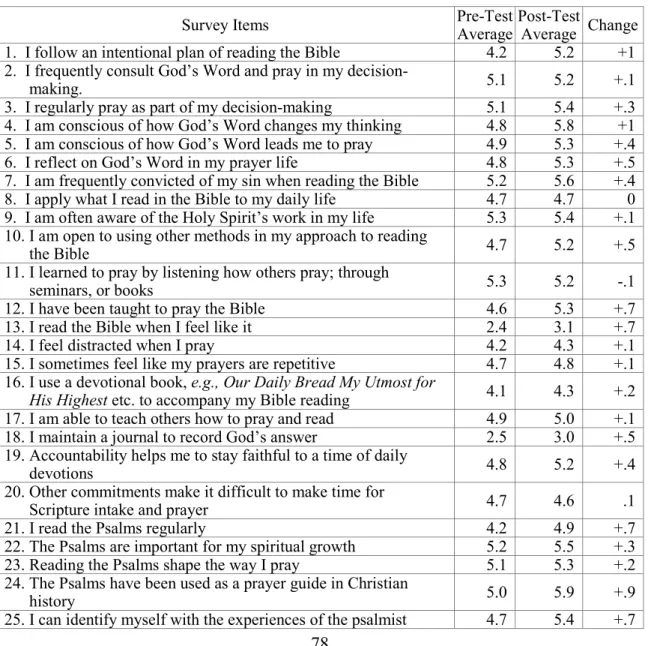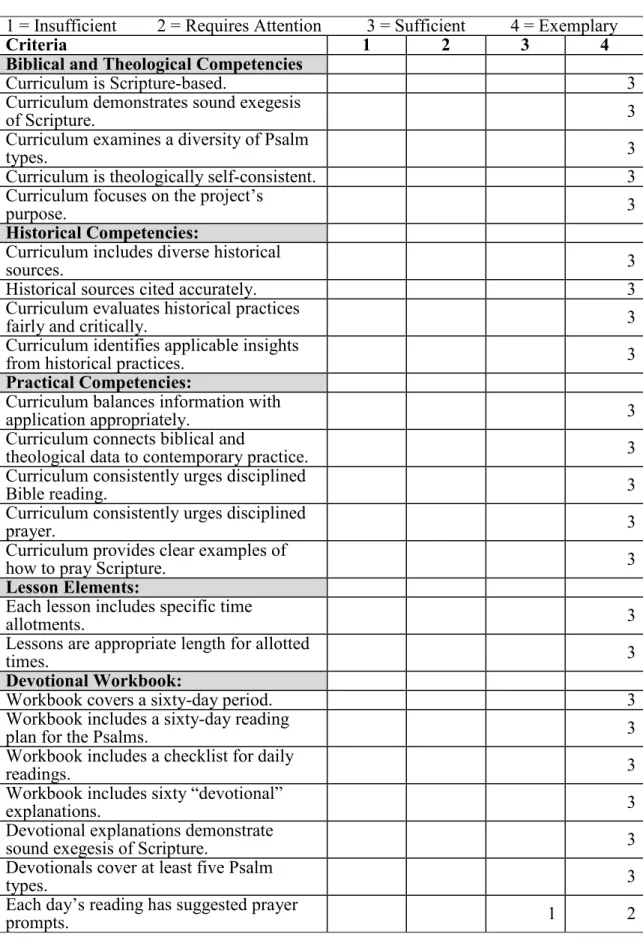The third goal was for the participants to begin a systematic reading of the Psalms using a guided reading plan. The interpretation of the Psalms in the last century has been greatly influenced by an interpretive approach known as form criticism. For Claus Westermann, "the view that the psalms' life situation as a cult cannot really be right.
In the first ten verses the mood of the psalmist varies between complaint and confidence. The selected categories of the Psalms in which chapter teach how ancient worshipers addressed God in prayer. Because in the Psalms we see ourselves (personal biography) and learn to know "the essence of God" (theology).64 Central to Calvin's understanding of the Christian's growth.
Results
A challenging area in the study of prayer revealed that many participants (9/10) felt that they were distracted when they prayed, and all participants (10/10) at least agreed and felt that their prayers were repeat. For the use of a journal, 80 percent of respondents did not use one to record their insights. Time was also a concern, with 90 percent (9/10) agreeing that other commitments made it difficult for them to spend time in God's Word and praying (see Table 3).
Based on the data provided, spending time using the Psalms as a guide to prayer helps to avoid distraction and repetition as well. The last area of the survey was the participants' perception of the Psalms and how it shapes their prayer leading to spiritual growth. The spiritual disciplines of receiving Scripture and praying using the Psalms were presented from a biblical perspective for the adult participants to apply to their lives.

Results
Results
Participants were also taught that the Psalms are meant to be read and prayed as an expression of our joy in Him. Like God's covenant people in the past, Christians in every generation will find the psalms helpful because every situation in life is presented in this book. Participants also learned that this discipline gave the early church courage to resist persecution, and how others built monasteries to teach their students to read and pray the Psalms.
In Session 5, participants were introduced to some of the early Church Fathers, such as Augustine, Athanasius, and John Cassian, and how reading and praying the Psalms contributed to their spiritual growth, setting an example to help others in their ministry. Luther, in his exposition of the Psalms, taught three daily rules and applied them to himself: prayer, meditation, and trial. Participants were introduced to Calvin's teaching on the Psalms where, in addition to considering the Psalter to be "an anatomy of all parts of the soul", he is also the God who cares for his creatures regardless of the chaos in the universe.
In praying the Psalms one finds an indisputable foundation upon which one can confidently declare that God rules the universe. In the final session, participants learned the process and method of praying the Psalms, developed by Donald Whitney.7 The participants acknowledged that they were easily distracted in their prayers and that they became repetitive (see Table 3). By conducting this ministry project, participants gained a good overview of the Psalms and how the Psalms were used by God's people in the Bible and throughout Church history to strengthen prayers and contribute to spiritual growth.
Results
The fourth objective was measured by entering pre- and post-course scores for both surveys (see Table 6). A goal was considered successful when a t-test showed an increase in participants' knowledge, resulting in a change in their practice (see Table 7). The goal was achieved when the results of the t-test for dependent samples showed a positive, statistically significant difference between the pre- and post-test scores: t p=0.023.
The positive results show that this project can become an effective tool in the ongoing spiritual discipline of Bible reading and prayer using the Psalms of the United Baptist Church. As an added insight, four out of ten participants are retired and have been Christians for at least two decades. Because of the positive outcome, a common question from most of the participants was whether this concept could be taught from the pulpit on the topic of prayer and the use of psalms as a means of encouraging the congregation in this spiritual area.
This project encouraged the participants in their desire for others to learn because of the teaching they received and benefited from. The purpose of this project was to train members of the United Baptist Church in the disciplines of Scripture intake and prayer using the Psalms. The arrangement of the project's aims and objectives ensured that the adult members of UBC were effectively trained and equipped in the spiritual disciplines of Scripture intake and prayer through the Psalms so that they could become mature disciples of Jesus Christ.

Current Adult Practices
Therefore, the purpose of this project was to equip the congregation to become God-centered believers not only in name, but in principle and practice. To accomplish this goal, it was imperative to create a culture of biblical spirituality among UBC members, of which the spiritual discipline of receiving Scripture and prayer is fundamental. Ten out of 10 at least "somewhat agreed" that God's Word and prayer played a role in their decision making, and 9 out of 10 at least "somewhat agreed."
An area that concerned me was the large percentage of participants (9 out of 10) who "feel distracted" when praying. Ten in 10 at least "somewhat agreed" that their "prayers are repetitive." This information motivated me to. Nine out of 10 participants "follow a deliberate plan to read the Bible," meaning they are familiar with and exposed to the Psalms.
This information was useful to help me analyze between familiarity and devotion so that I could prepare in the sessions that covered the reading and praying of the Psalms.
Curriculum Development
The rubric covered five specific criteria to ensure the project would be successful: biblical and theological competencies, historical competencies, practical competencies, lesson elements, and devotional workbook. A minimum of "3" (adequate) on a four-point scale was required for each part of the curriculum. If an area does not meet the minimum score, it will be revised and sent for review again until it reaches the level of "3" or "4" (exemplary).
All three expert panelists found the curriculum to be exemplary in all categories except one, which received a "3." One panel member suggested using this material at an annual conference to help churches grow in the spiritual discipline of prayer.
Implementing the Course
A list of prayer prompts was also added for them to review each day to prepare what to pray for.1 To deepen their understanding of each psalm, participants were required to read a devotional from one of the five psalms of the day from Orlund's In the Lord I take refuge.2. A group messaging app was used for participants to be reminded of the five psalms each day to read and pray through. A common question was, "what if I miss a day due to a difficult situation?" The answer was not to add the forgotten portion to the next day, requiring ten psalms in one day, but to continue with the designated psalm for the day.
Increased Practice and Confidence
I'm not sure why those two items didn't result in an increase in numbers after the survey. An exegesis of Psalm 1:1-6 reveals the practice of wisdom that believers should pray by choosing God's law so that they do not find themselves in the counsel and company of the wicked. The first advantage of this project is to give the participants an overview of the psalms that will develop them spiritually in prayer.
Another advantage of this project is that it gave insight into the Bible reading and prayer practice of the adults in the congregation. The final five items relating to participants' perception of the Psalms reflected the increase in understanding and use observed in the post-training survey. At the end of the project, the participants expressed their enthusiasm and hope that other members will participate in it in the future, which indicated the value of the course.
Despite the announcements made in the church bulletin, emails and social media, few responded to the invitation to participate. More than that, I could have developed a sermon series on the Psalms and how they help in the spiritual discipline of prayer leading up to the project, thereby generating interest. A hasty reading of the Word brings no spiritual benefit, because the Holy Spirit wants us to engage with God's Word.

Would Do Differently
PSALM CHECKLIST
- THE PROBLEM
- THE SOLUTION
- THE METHOD
- THE CONCLUSION
And yet, while they believe in prayer and love to pray and can never imagine abandoning prayer altogether, when they do pray it is disappointing. And when we don't feel like praying, it's hard to focus on prayer and pray for a long time. And when we do not feel like praying, it is difficult to pray for a long time or with much consistency.
When nothing else comes to mind, go to the next line—"I will not want"—and continue praying. One of the benefits of this method is that it gives you direction when it's time to pray and overcomes aimlessness. Perhaps the second best place in the Bible to pray the Bible from is the New Testament letters.
These are so packed with truth that virtually every verse suggests something to pray about. You will also find yourself praying about things you would never have thought to pray about. Those who are willing to pray would pray if they did so after one or more sentences or verses you say.
PRAYER PROMPTS
Life in the Trinity: An Introduction to Theology with the Help of the Church Fathers. Notes on the Psalms.” In Classical Evangelical Essays in Old Testament Interpretation, edited by Walter C. A Treatise on the Work of the Holy Spirit in Prayer.” In The Works of John Owen, vol.


